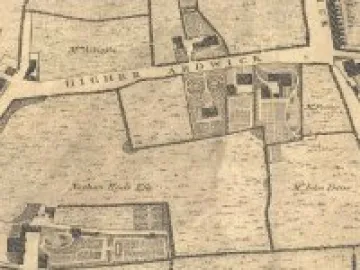Garden services
Today, lots of plants are available mail order. Gardening equipment can be found at garden centres and DIY stores. If you want a garden makeover you might look for a garden designer. And, for someone to mow the lawn, cut trees or generally tidy up the garden, you may well go to the internet to find gardening services.
Two hundred years ago you would have found all these services available at a Nursery. Here we look at some of these.
Garden design
There have been a few very famous garden designers over the centuries. One of the best known is Lancelot 'Capability' Brown (1716-1783), who got his nickname from telling would-be clients that their grounds had 'great capabilities' for improvement. His connection with Cheshire is very limited. Humphry Repton (1752-1818) had a different approach. His Red Books were water colours of the existing grounds, with flaps which could be brought over to show how the grounds could look if the owner employed Repton to bring about the changes. There is a Repton Red Book for Rode Hall and another for Aston Hall.
But these were designers for owners of huge estates. By the end of the 18th century there was a new middle-class who bought villas with relatively small gardens. So they would often turn to the local nurseryman to lay out their gardens. This doesn't mean that all nurserymen were skilled at this and writers often made reference to poor design, though whether this was due to the nurseryman or the customer's demands, we don't know. In 1810, Walter Nicol wrote:
'To pretend to represent, on a few acres, the buildings, plantations, and waters of a Place, is absurd. Yet we sometimes meet with the belt, the shrubbry, (sic) the double approach, the lawn, the kitchen garden, the court of offices, the prospect tower, the temple, and even the lake, huddled together in a very extraordinary manner.' (The Villa Garden Directory, page 1).
Garden designs in Ardwick, Manchester in 1794.
Alexander Bannerman in Liverpool offered to lay out and improve parks, approaches, pleasure grounds and gardens; John Ker, in Chorley worked for several years creating gardens before setting up his nursery; Thomas Ayres at Duffield, near Derby, likewise could design and lay out parks, lawns, lakes, parterres, pleasure grounds and kitchen gardens.
In 1789 George Rogers, a nurseryman in Chester, had a piece of luck. William Emes (1709-1803), was less well-known than 'Capability' Brown, but had a similar style and he designed a lot of gardens in Staffordshire, Shropshire, Derbyshire, Cheshire and North Wales. When his wife died in 1789, Emes moved to Hampshire, but his foreman, John Parry, remained in Wales and entered into partnership with George Rogers. His previous post with William Emes provided Rogers with a strong selling point.
Planting and garden maintenance
Nursery workers had to be skilled in many areas and planting trees was one of the jobs that customers wanted undertaken. In November 1791 John Fazakerley of Prescot purchased 120 trees and paid 2 shillings for them to be planted (see ledger DDX 363/2 page 35). Planting was often required. If trees are not planted properly, they are likely to die. So asking the nurseryman to not only supply but also to plant trees would have been necessary if the customer's own gardener didn't have either the skill or the time to do it himself.
Other tasks included digging, hoeing, pruning and sometimes simply taking goods from one place to another. Not all the entries in the ledgers tell us what the men were doing, but they often say how many were involved and for how long.
Finding a gardener
Nurseries often acted as a sort of employment agency. Gardeners looking for work would leave their names and details with the nurseryman and prospective employers would seek them out. Equally, prospective employers might ask the nurseryman to find them a suitable candidate. In 1790 McNivens, in Manchester, advertised for someone 'To look after a small Garden, and who understands the Management of Horses'. Not everyone could afford a full-time gardener and where they were expected to undertake other duties as well they were probably not the most skilled.
It was best if the nurserymen knew the prospective employee personally. In 1838 Francis and James Dickson of Chester ended a long advertisement with the words 'Several experienced Gardeners, Woodmen, and Farming Bailiffs at present on our books in want of Situations, whose character and abilities may be fully relied upon.'
